|
Czech Models' 1/48 Scale
Ryan FR-1
Fireball
by Chip Jean
|
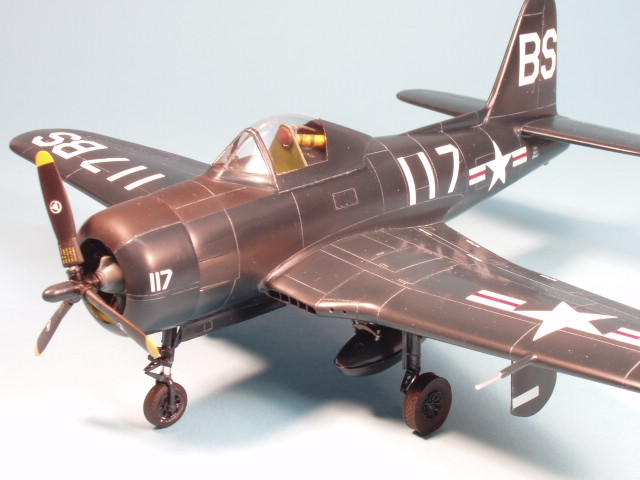 |
|
Ryan FR-1 Fireball |

Czech Model's
1/48 scale Ryan FR-1 Fireball is available online from Squadron.com
Why a Fireball?
Why do we choose the subjects we build? There are any number of
reasons; a particular subject is visually appealing to us, it’s
historically significant, it’s performance was extraordinary, maybe we
have a personal connection to a subject, maybe we’re attracted to the
box art, or maybe we’ve just heard
that it’s a really nice kit. But the Ryan Fireball?
It’s certainly not an appealing aircraft. Its performance was nothing
out of the ordinary for its time and while it’s unique in that it was
powered by a radial engine-driven propeller in the front and a jet
engine in the back, it doesn’t offer much in the way of historical
significance.
So what got into me to want to build one of these as soon as it came
out? Being an old practical joker and class comedian, I figured this
would be a fun way to make things a little tougher on head aircraft
judges at contests and to stir the pot a little. “C’mon Chip”, you say,
“how can this little model make trouble for those nice guys who
volunteer to be head aircraft contests?” Easy. You can make a valid
argument for this model to go into any one of four categories. Single
engine prop – it has one propeller. Single engine jet – is has one jet
engine.
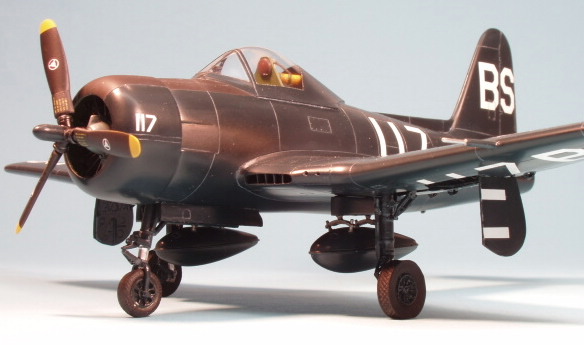
Multi-engine prop – it has two engines, one of which is a propeller.
Multi-engine jet – it has two engines, one of which is a jet.
So, here's how I see it going down when the model is entered into
competition. You can be sure, no matter what category I enter this model
in, one of our brethren is going to complain to the head aircraft judge
about its placement. And the head aircraft judge, being the nice guy
that he is and wanting to please as many people as he can..... before
the results are announced.....will move my model to another category,
where it will be as equally qualified as it was in the previous
category.
At this point someone else may complain about this new category that
it’s in, or I may, (depending on my mood) complain myself about it being
moved.
This could be a lot of fun!
The Kit
This is a typical Czech Models, limited run kit: resin cockpit,
engine, propeller hub, wheels and wheel wells; vacuform canopy; and
injected plastic parts with recessed panel lines.
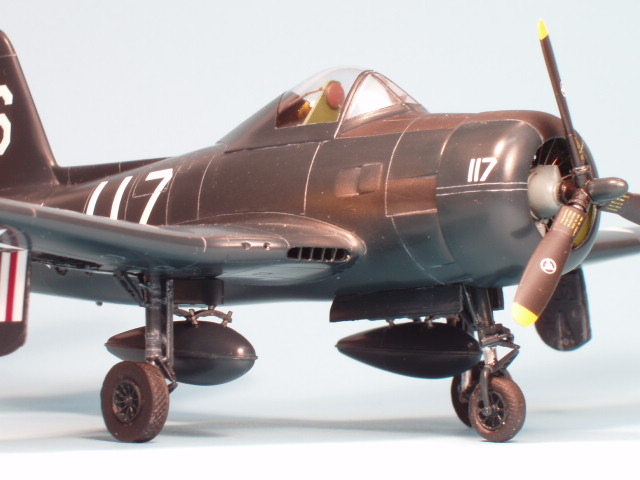
The plastic parts are kind of thick, but there is no flash, and there
are no locating pins. As long as you keep in mind that this is a limited
run kit, you won’t be disappointed with the kit and you’ll do fine.
Parts breakdown is typical, so you can pretty much toss the
instructions away. Also included with the kit is Squadron’s Mini In
Action for the Fireball. Since I usually don’t like to do research, this
was a nice addition.
Construction was mostly out of the box. I added some wire pushrods to
the engine and replaced the sad looking kit pitot tube with brass tube
and rod.
Everything else is OOB. I only encountered two problems during
construction. First was a serious gap at the lower, forward,
wing-to-fuselage joint. It took a few application of CA gel and a good
bit of sanding to fix it. Fortunately, there isn’t much surface detail
in that area.
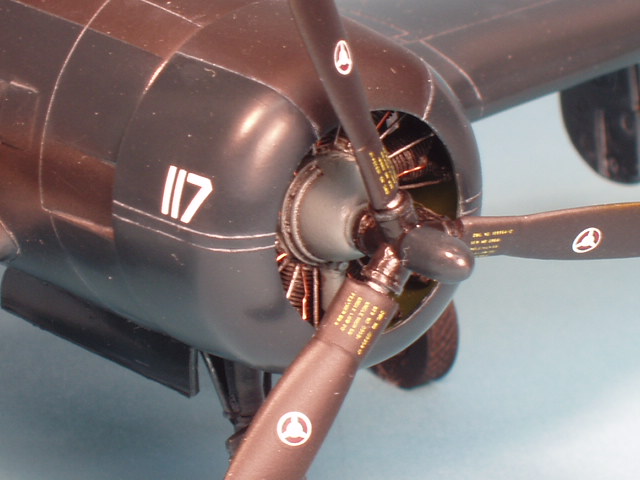
The biggest problem was getting enough weight in the front so I
wouldn’t have a tail sitter. The main gear are far forward and there’s a
lot of thick plastic behind them so you’ve got to get a lot of weight in
a small space. I filled the area above the nose wheel well between the
cockpit and firewall with lead, but it wasn’t enough, so I pounded a ½
oz. Sinker flat, cut it into pieces and glued the pieces to the front of
the firewall behind the engine. Painted flat black, you can’t tell the
weight is there.
For markings, you have two choices; gloss sea blue with red stripes
on your stars and bars and gloss sea blue without red stripes on your
stars and bars. I used Model Master gloss sea blue. Kit decals are
excellent. They are thin but opaque, give you plenty of time to get them
in the right spot, but once hit with setting solution, settle down
quickly.
Since these aircraft were only in service for two years and gloss sea
blue paint didn’t weather very fast, I was forced to settle on a fairly
clean finish.
But, to me, gloss sea blue finishes are boring, so I mixed up a
medium gray wash using oil paint and turpenoid and used it in the panel
lines.
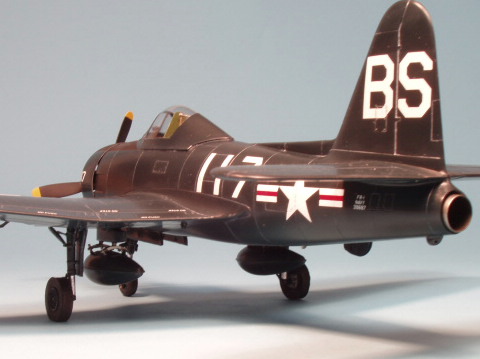
Next, I sprayed Model Master semi-gloss lacquer over the whole
aircraft, except the anti-glare panel and the propellers, which got a
spraying of Testors Dullcote, and finally, I added exhaust staining from
the radial engine by spraying streaks of Alclad II light burnt metal
behind the cowling and then lightly oversprayed that with a misting of
Testor's Exhaust Metalizer.
This is the third Czech Models kit I’ve built (XP-77 and XP-55 being
the other two) and I love them. They do a good job on aircraft that you
wouldn’t otherwise see in 1/48th scale.
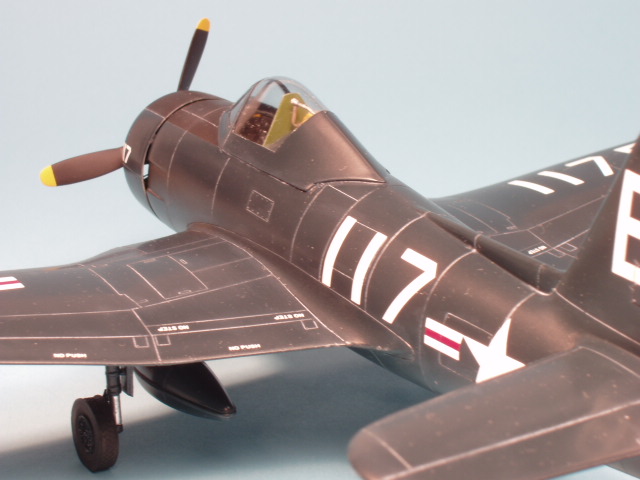
They’re certainly not shake & paint kits (yeah, I know everybody says
‘shake & bake’, but I think shake & PAINT is more appropriate), but as
long as you go into the project with that understanding, you’ll have a
fun time.
Click on the thumbnails
below to view larger images:
Model, Images and Text Copyright ©
2006 by Chip Jean
Page Created 06 March. 2006
Last Updated 21 February, 2007
Back to HyperScale
Main Page
|
Home
| What's New |
Features |
Gallery |
Reviews |
Reference |
Forum |
Search